Results
| | This section is empty. You can help by adding to it. (May 2023) |
The 1997 Moscow City Duma election was held December 14 of that year to the Moscow City Duma, the city's unicameral parliament (city council).
Participating in the election were 28 associations and four electoral blocs. [1]
In 1995, the deputies refused to schedule new elections and instead extended their term for a further two years. This provoked a two-year court case that ended in the summer of 1997 with a ruling that the Duma had acted illegally in extending its powers.
The "Nikolai Gonchar" bloc was the only bloc that adopted a platform critical of the way Mayor Yury Luzhkov ran the city. Among posters were "In this city, there should be a separation of powers, but the present Moscow City Duma is nothing but a pie with no filling". [2] The bloc, which was set up by the "Our City" movement, the Moscow Association of Councils of Territorial and Social Self-Government, and the Moscow branch of the Democratic Party of Russia, included 33 candidates. The "My Moscow" bloc campaign stressed that "Muscovites support the Mayor's actions" and focused on solving the city's ecological and transportation problems.
| | This section is empty. You can help by adding to it. (May 2023) |

The politics of Russia take place in the framework of the federal semi-presidential republic of Russia. According to the Constitution of Russia, the President of Russia is head of state, and of a multi-party system with executive power exercised by the government, headed by the Prime Minister, who is appointed by the President with the parliament's approval. Legislative power is vested in the two houses of the Federal Assembly of the Russian Federation, while the President and the government issue numerous legally binding by-laws. Since the collapse of the Soviet Union at the end of 1991, Russia has seen serious challenges in its efforts to forge a political system to follow nearly seventy-five years of Soviet governance. For instance, leading figures in the legislative and executive branches have put forth opposing views of Russia's political direction and the governmental instruments that should be used to follow it. That conflict reached a climax in September and October 1993, when President Boris Yeltsin used military force to dissolve the parliament and called for new legislative elections. This event marked the end of Russia's first constitutional period, which was defined by the much-amended constitution adopted by the Supreme Soviet of the Russian Soviet Federative Socialist Republic in 1978. A new constitution, creating a strong presidency, was approved by referendum in December 1993.
A duma is a Russian assembly with advisory or legislative functions.

Tver is a city and the administrative centre of Tver Oblast, Russia. It is situated at the confluence of the Volga and Tvertsa rivers. Tver is located 180 kilometres (110 mi) northwest of Moscow. Population: 416,216 (2021 Census).
The Russian United Democratic Party Yabloko is a social-liberal political party in Russia. The party consequently participated in the elections of deputies of the State Duma of the Federal Assembly of the Russian Federation of all eight convocations. Until 2003, Yabloko was represented by a faction in the State Duma and later until 2007 by individual deputies. In March 2002, the party became a full member of the Liberal International, and since November 1998, it had been in observer status. The founder of the party Grigory Yavlinsky is an honorary vice-president of the Liberal International and winner of its Prize for Freedom. Since 2006, Yabloko has been a member of the Alliance of Liberals and Democrats for Europe (ALDE). As of 2021, the party was represented by factions in 4 regional parliaments of Russian Federation. In addition, members of the party were deputies of 13 administrative centers of the subjects of the Russian Federation, 183 representatives of the party were municipal deputies in Moscow, 84 in Saint Petersburg.
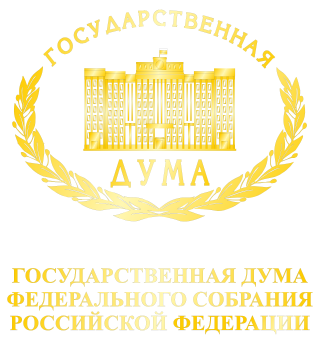
The State Duma, commonly abbreviated in Russian as Gosduma, is the lower house of the Federal Assembly of Russia, while the upper house is the Federation Council. The Duma headquarters are located in central Moscow, a few steps from Manege Square. Its members are referred to as deputies. The State Duma replaced the Supreme Soviet as a result of the new constitution introduced by Boris Yeltsin in the aftermath of the Russian constitutional crisis of 1993, and approved in a nationwide referendum.
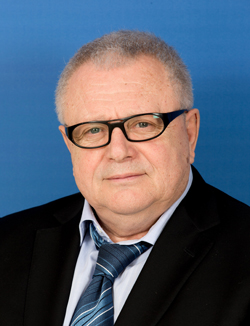
Konstantin Alekseyevich Titov is a Russian politician. He was the Senator from Samara Oblast from 2007 to 2014 and Governor of Samara Oblast from 1991 till 2007.

Anatoly Ivanovich Lisitsyn is a Russian politician, who was the first governor of Yaroslavl Oblast.
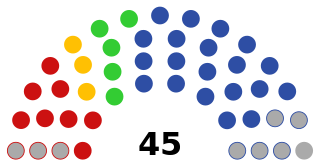
The Moscow City Duma is the regional parliament of Moscow, a federal subject and the capital city of Russia. As Moscow is one of three federal cities, the city duma's legislation can only be overridden by the mayor and the federal government.

The State Duma, also known as the Imperial Duma, was the lower house of the Governing Senate in the Russian Empire, while the upper house was the State Council. It held its meetings in the Taurida Palace in St. Petersburg. It convened four times between 27 April 1906 and the collapse of the Empire in February 1917. The first and the second dumas were more democratic and represented a greater number of national types than their successors. The third duma was dominated by gentry, landowners and businessmen. The fourth duma held five sessions; it existed until 2 March 1917, and was formally dissolved on 6 October 1917.

The Governor of Moscow Oblast is the governor of Moscow Oblast, a federal subject of Russia.
Democratic Russia was the generic name for several political entities that played a transformative role in Russia's transition from Communist rule. In 1991–93, the Democratic Russia Movement was the largest political organization in the country and Boris Yeltsin's base of political support.

The elections for the 5th convocation of the Moscow City Duma took place on 11 October 2009. Out of the 35 deputies, 18 were elected through party lists using proportional representation, while the remaining 17 were elected from single-member constituencies. In order to secure seats in the City Duma through proportional representation, parties needed to surpass a 7% popular vote threshold. The term of office for the newly elected City Duma members is five years, which was extended from the previous four-year term.

Valery Fyodorovich Rashkin is a Russian politician who was a deputy for the Communist Party in the State Duma in 2000–2022. From March 2003 to April 2021, he was a member of the Presidium of the party's Central Committee.
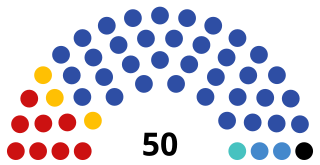
The Moscow Oblast Duma is the regional parliament of Moscow Oblast, a federal subject of Russia.

The Opposition Platform – For Life was a pro-Russian and Eurosceptic political party in Ukraine.
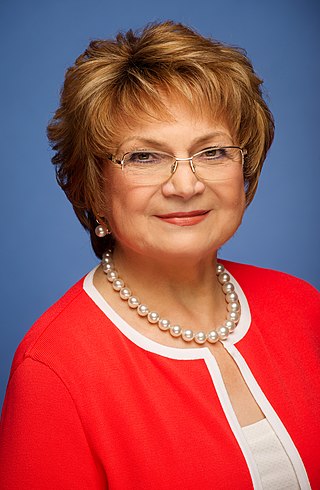
Lyudmila Ivanovna Shvetsova was a Russian statesman and politician.

Viktor Petrovich Vodolatsky is a Russian politician who is a member of the Federal Assembly, a Deputy of the State Duma of the V, VI, VII convocations. He is a member of the United Russia faction, a First Deputy Chairman of the State Duma Committee on CIS Affairs, Eurasian Integration and Relations with Compatriots, and a Chairman of the Supreme Council of SKVRiZ.

Alexander Leonidovich Burkov is a Russian politician who served as governor of Omsk Oblast from 2017 to 2023. He is a member of the Central Council of A Just Russia — For Truth party.

An election to the Kiev City Duma was held on 5 August [O.S. 23 July] 1917. The election took place in the aftermath of the February Revolution, the formation of the Ukrainian Central Rada and the First World War. The election resulted in a victory for the Russian and Jewish socialists.

Sergey Aleksandrovich Popov, is a Russian politician, who was a member of the Federation Council of Omsk Oblast on legislative authority between 29 September 2016 and February 2018.